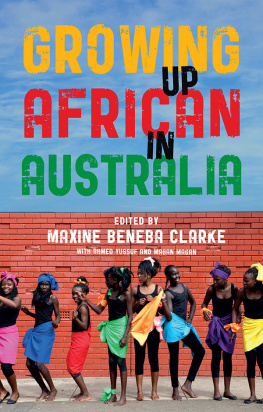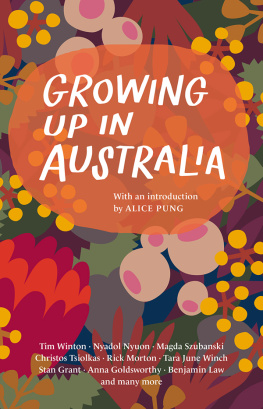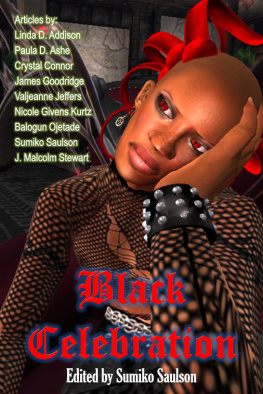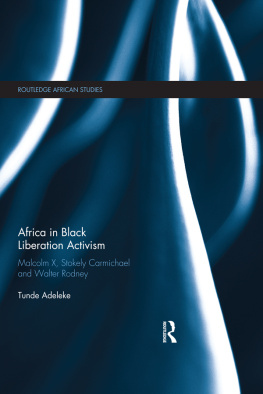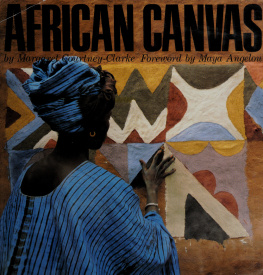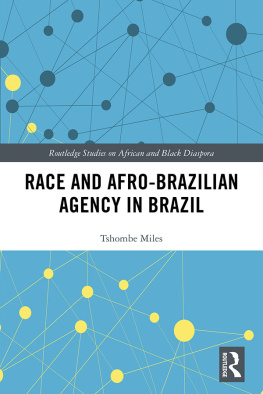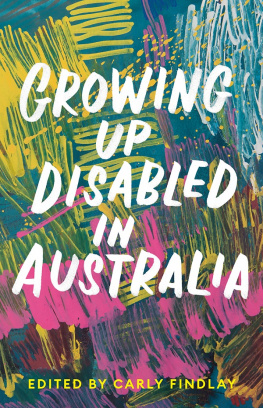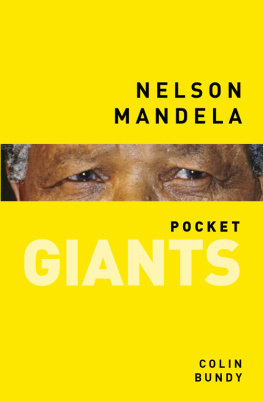Published by Black Inc.,
an imprint of Schwartz Publishing Pty Ltd
Level 1, 221 Drummond Street
Carlton VIC 3053, Australia
www.blackincbooks.com
Introduction and selection Maxine Beneba Clarke and Black Inc., 2019
Maxine Beneba Clarke asserts her moral rights in this collection.
Individual stories retained by the authors, who assert their rights to be known as the author of their work.
ALL RIGHTS RESERVED.
No part of this publication may be reproduced, stored in a retrieval system, or transmitted in any form by any means electronic, mechanical, photocopying, recording or otherwise without the prior consent of the publishers.
9781760640934 (paperback)
9781743820872 (ebook)
Cover design by Kim Ferguson
Cover images Louise Whelan
Text design by Thomas Deverall and Akiko Chan
Typesetting by Akiko Chan
For Africa, where we originated.
For Australia, our home.
Introduction
Maxine Beneba Clarke
African-diaspora Australians are settlers, albeit black-bodied, on black land Aboriginal land of which sovereignty has never been ceded. For all the othering and discrimination faced by African-diaspora Australians in the current climate, there is no escaping the perhaps uncomfortable reality that we, the colonised, are sometimes also we, the colonisers. Any discussion of blackness in an Australian context must be set against the history of this truth: we, too, are settlers here.
Despite what the anti-immigration rhetoric of successive Australian governments would have us believe, African-diaspora Australians are not a recent phenomenon. Coins belonging to the medieval Kilwa Sultanate in East Africa have been found on the Wessel Islands, indicating trade with Africa as far back as the twelfth century. The first recorded African-diaspora settlers were black convicts, eleven in number, transported by the British, on the First Fleet of 1788.
On their release, many bought land and brought up families in the area of Pennant Hills in western Sydney. Over time, because of its inhabitants of colour, the area became known to white settlers as Dixieland, named after the area of Americas Lower South that incorporated Mississippi, Alabama, Louisiana and four other states of the slave belt (which were soon joined by four states of the Upper South) and made up the Confederate States of America from 1861 to 1865.
Though Ned Kelly is Australias most infamous bushranger, one of the African arrivals on the First Fleet was Australias first: the lesser known John Caesar, also known as Black Caesar. History still cannot pin down his place of birth. Madagascar or the West Indies, so it was heard. John Caesar became a servant in the parish of St Paul, in Deptford, England. According to transcript, he stole 240 shillings and thus arrived in the penal colony of New South Wales, on the Alexander. Black Caesar was a giant of a man. To eat beyond meagre rations, he stole. His life was a litany of thefts, captures, escapes and re-offences. Eventually, he formed a gang of men who became Australias first known bushrangers.
In addition to suffering some of the degradations brought about by their dark complexions, early arrivals of African descent actively participated in the colonial project, and Black Caesar was no exception, most notably becoming involved in a shameful fight with Aboriginal warrior Pemulwuy.
Then theres William Blue Billy Blue who hailed from Jamaica: either the Caribbean island of Jamaica, or Jamaica in the New York borough of Queens. William Blue had worked in England as a sometime labourer and a chocolatier, and was transported to Botany Bay in 1796 at age twenty-nine, aboard the Minorca, for stealing sugar. All accounts paint Billy Blue (as he became known) as a spirited, canny character. He occupied a curiously respected position in white society, settling around The Rocks in Sydney with his English-born ex-convict wife and their six children. Governor Macquarie appointed him a harbour watchman and constable. He started a ferry service, which the governor used, and he amassed land. Paintings portray Billy Blue standing proud-eccentric, in the royal blue top hat or the naval jacket of which he was fond.
Black Jack Anderson is Australias only known pirate. Wide accounts concur the African-American was as charismatic as he was ruthless. He arrived on the west coast of Australia in 1826, on the whaling vessel Vigilant. A brawl saw him accused of murder, and he took up residence with some of his crew in the dangerous waters of the Archipelago of the Recherche, on what is known as Middle Island. Under Andersons command, the outlaws raided ships travelling between Adelaide and Albany. Andersons body is rumoured to be buried on Middle Island. There are tales shameful ones of his brutalisation of local Kaurna people.
There are others, too many here to count. William Cuffay: a tailor by trade, and the son of a freed St Kitts slave, was transported from England in 1848 for his political action among the working classes. Orator and newspaper vendor Daniel Henderson, born in Kingston, Jamaica, is thought to have migrated to Australia voluntarily in 1865. These African-diaspora settlers display all the flair, ferocity, faults and foibles of their Anglo-Australian counterparts, yet they are largely absent from the knowledge of a vast number of Australians.
The seed for Growing Up African in Australia was born of a Twitter discussion between the editor and co-curators, noting the link between apartheid in South Africa and the genocide, dispossession and dehumanisation of First Nations people in Australia, through South Africas modelling of apartheid on Queenslands Aboriginal Protection Act (1897). These stories make me think its high time we did a Growing Up African in Australia book, this editor mused. Eighteen months later, amid allegations of rampant African gang crime in Melbourne, and the Australian medias increasing demonisation of the African-Australian community, Magan Magan and Ahmed Yussuf contacted me and said: Remember your suggestion? Its now time. We approached Black Inc., who had already published the groundbreaking anthologies Growing Up Asian in Australia and Growing Up Aboriginal in Australia. The publishers took us on board.
Our first discussions regarding the collection were about scope. From the sixteenth to the nineteenth century, more than 10 million Africans, mostly from Central and West Africa, were dispersed across the Americas as human cargo in the transatlantic slave trade. They were sold to work on slave plantations, and as domestic servants, field workers or labourers. Australia has not been untouched by this 400-year trade in black lives. Recently, the work of academic Clinton Fernandes has confirmed that the proceeds of British slavery, and the financial compensation paid to slave-owners on abolition, helped establish significant and revered members of early colonial society in Australia.
Pointedly, we decided that Growing Up African in Australia would be an African-diaspora anthology that acknowledged this colonial truth, sharing stories from Australians of African descent, no matter the route their journey to Australia had taken. We called for submissions by Australians from across the African diaspora from those who journeyed to Australia directly from the African continent to those who journeyed to Australia over hundreds of years and several generations via the United States, South America, the United Kingdom, the Caribbean or elsewhere.
This anthology was initiated, written, curated, edited and driven by members of the African-diaspora community in Australia. The process of compiling its contents has been nothing short of extraordinary. Reading every submission was life-affirming, and it was a genuine privilege for the curatorial team to read and consider passionate, engaging, innovative and heartfelt work from almost every region of the African diaspora. Our voices are strong, our roots run deep, and our stories are powerfully diverse.

